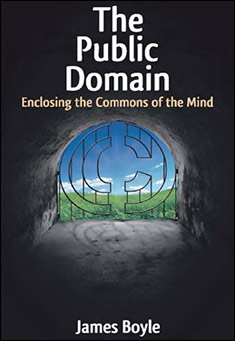"Boyle is one of the world's major thinkers on the centrality of the public domain to the production of knowledge and culture. He offers a comprehensive and biting critique of where our copyright and patent policy has gone, and prescriptions for how we can begin to rebalance our law and practice. It is the first book I would give to anyone who wants to understand the causes, consequences, and solutions in the debates over copyrights, patents, and the public domain of the past decade and a half."--Yochai Benkler, Berkman Professor of Entrepreneurial Legal Studies, Harvard Law School.
Excerpt:
On August 13, 1813, Thomas Jefferson took up his pen to write to Isaac McPherson. It was a quiet week in Jefferson’s correspondence. He wrote a letter to Madison about the appointment of a tax assessor, attempted to procure a government position for an acquaintance, produced a fascinating and lengthy series of comments on a new “Rudiments of English Grammar,” discussed the orthography of nouns ending in “y,” accepted the necessary delay in the publication of a study on the anatomy of mammoth bones, completed a brief biography of Governor Lewis, and, in general, confined himself nar-rowly in subject matter. But on the 13th of August, Jefferson’s mind was on intellectual property, and most specifically, patents.
Jefferson’s writing is, as usual, apparently effortless. Some find his penmanship a little hard to decipher. To me, used to plowing through the frenzied chicken tracks that law students produce during exams, it seems perfectly clear. If handwriting truly showed the architecture of the soul, then Jefferson’s would conjure up Monticello or the University of Virginia. There are a few revisions and interlineations, a couple of words squeezed in with a caret at the bottom of the line, but for the most part the lines of handwriting simply roll on and on—“the fugitive fermentation of an individual brain,” to quote a phrase from the letter, caught in vellum and ink, though that brain has been dust for more than a century and a half.
I love libraries. I love the mushroom smell of gently rotting paper, the flaky crackle of manuscripts, and the surprise of matching style of handwriting with style of thought. Today, though, I am viewing his letter over the Internet on a computer screen. (You can too. The details are at the back of the book.)
I think Jefferson would have been fascinated by the Internet. After all, this was the man whose library became the Library of Congress, who exemplifies the notion of the brilliant dabbler in a hundred fields, whose own book collection was clearly a vital and much consulted part of his daily existence, and whose vision of politics celebrates the power of an informed citizenry. Admit-tedly, the massive conflicts between Jefferson’s announced principles and his actions on the issue of slavery have led some, though not me, to doubt that there is any sincerity or moral instruction to be found in his words. But even those who find him a sham can hardly fail to see the continual and obvious joy he felt about knowledge and its spread.
In the letter to Isaac McPherson, a letter that has become very famous in the world of the digerati, this joy becomes manifest. The initial subject of the correspondence seems far from the online world. McPherson wrote to Jeffer-son about “elevators, conveyers and Hopper-boys.” Specifically, he wanted to know Jefferson’s opinion of a patent that had been issued to Mr. Oliver Evans. Jefferson devotes a paragraph to a recent retrospective extension of patent rights (he disapproves) and then turns to Evans’s elevators.
Patents then, as now, were only supposed to be given for inventions that were novel, nonobvious, and useful. Jefferson had considerable doubt whether Evans’s device, essentially a revolving string of buckets used to move grain, actually counted as “an invention.” “The question then whether such a string of buckets was invented first by Oliver Evans, is a mere question of fact in mathematical history. Now, turning to such books only as I happen to possess, I find abundant proof that this simple machinery has been in use from time immemorial.” Jefferson cites from his library example after example of references to the “Persian wheel”—a string of buckets to move water. The display of scholar-ship is effortless and without artifice. If the device existed to move water, he declares, Mr. Evans can hardly patent it to move grain. “If one person invents a knife convenient for pointing our pens, another cannot have a patent right for the same knife to point our pencils. A compass was invented for navigating the sea; another could not have a patent right for using it to survey land.”




